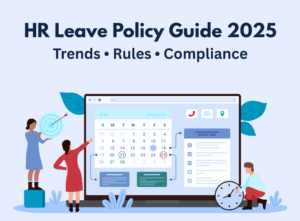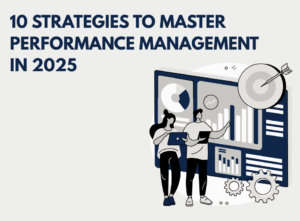Introduction
Recruitment is a vital component of the Human Resource Management System (HRMS) that is pivotal in attracting and selecting the right talent for an organization. The recruitment process involves identifying, sourcing, evaluating, and hiring qualified individuals to fill job vacancies. The recruitment process holds immense significance for organizations as it directly impacts their ability to acquire skilled and capable employees who contribute to organizational success.
Why does the Recruitment Process hold importance?
-
To Acquire the Right Talent
An effective recruitment process ensures that organizations have a pool of qualified candidates, enabling them to select individuals with the necessary skills, qualifications, and experience required for the job. This process increases the likelihood of finding the right fit for the organization’s needs.
-
To enhance Organizational Performance
Recruiting high-calibre talent can significantly improve performance. Organizations can tap into their expertise, creativity, and innovation by attracting skilled individuals and enhancing productivity, efficiency, and competitive advantage.
-
To Build a Competitive Workforce
A well-executed recruitment process helps organizations build a diverse and competitive workforce. By attracting candidates from various backgrounds and experiences, organizations can foster a culture of inclusivity, creativity, and adaptability, which are vital for long-term success.
While hiring candidates, companies refer to recruitment strategies. Companies systematically plan and approach to attract, assess, and hire qualified candidates for job vacancies. These strategies are essential for companies to find the right talent that aligns with their organizational goals, culture, and requirements. Recruitment strategies help companies maximize their chances of identifying and selecting the most suitable candidates, reduce hiring costs, improve retention rates, enhance organizational performance, and gain a competitive advantage.
To attract and retain top talents, companies should implement the following recruitment process strategies:
-
Employer Branding
Companies must develop a strong employer brand by showcasing their unique culture, values, and opportunities for growth. Also, they must highlight employee testimonials, benefits, and career advancement prospects to attract top candidates who resonate with the company’s values and vision.
- Targeted Job Advertising
Utilizing various channels to advertise job openings, including online job boards, social media platforms, industry-specific websites, and professional networks, will be helpful. Moreover, the HR department can also tailor job descriptions and advertisements to attract the specific skill sets and qualifications desired for the position.
-
Employee Referral Programs
Encourage employees to refer potential candidates through referral programs. Offer incentives or rewards for successful referrals. This strategy taps into the network of current employees, who are likely to recommend individuals who align with the company’s values and have the necessary skills.
- Proactive Talent Sourcing
Companies must actively search for and approach potential candidates, even if they are not actively job-seeking. HRs can do it through networking events, industry conferences, and online platforms like LinkedIn. Further, they should engage with passive candidates with the desired skills and experience. Doing so will provide them with compelling reasons to consider opportunities with the company.
- Candidate Experience Enhancement
Streamline the recruitment process to create a positive candidate experience. This process includes timely communication, clear job descriptions, efficient interview scheduling, and providing feedback to candidates. A positive experience during recruitment enhances the company’s reputation, increases the likelihood of top candidates accepting offers, and fosters long-term engagement and loyalty.
How does a good recruitment process strategy influence a company?
Let’s understand this in a simple way- a good recruitment strategy influences a company by attracting top talent, ensuring a skilled and diverse workforce, and enhancing competitiveness and productivity. And it helps acquire the right people for the right roles and foster a positive organizational culture, ultimately contributing to the company’s success and growth. Here are a few more reasons to adopt a strong recruitment policy:
-
Improved Quality of Hires
A well-structured recruitment process ensures the selection of qualified candidates with the necessary skills and competencies. Furthermore, it leads to improved performance, reduced turnover, and increased employee engagement and satisfaction.
-
Reduced Hiring Costs
Effective recruitment practices help organizations minimize hiring costs by reducing turnover rates and the need for frequent recruitment. Organizations can achieve better long-term retention by selecting candidates who align with the organization’s goals and values.
-
Enhanced Organizational Culture
The recruitment process directly impacts the organizational culture by attracting individuals who align with the organization’s values, mission, and vision. And it undoubtedly contributes to a positive work environment, increased d employee morale, and a shared sense of purpose.
-
Competitive Advantage
Companies gain a competitive edge in the market by recruiting talented individuals. And as we know that hiring skilled employees contribute to innovation, creativity, and improved customer service. Moreover, hiring talented employees enhances the organization’s competitive position.
-
Helps in Sourcing Candidates
Effective recruitment strategies utilize multiple channels to source candidates, including online job portals, social media platforms, professional networks, and employee referrals. Further, it broadens the candidate pool and increases the chances of finding suitable candidates.
Conclusion
The recruitment process is a critical function within HRM that significantly influences an organization’s success. It ensures the acquisition of talented individuals who can contribute to organizational goals, enhance performance, and shape the organizational culture. Organizations can attract and select the right talent by adopting effective recruitment strategies, resulting in improved productivity, reduced turnover, and a sustainable competitive advantage. Thus, organizations must prioritize the recruitment process as a strategic function that drives the organization’s overall success.





